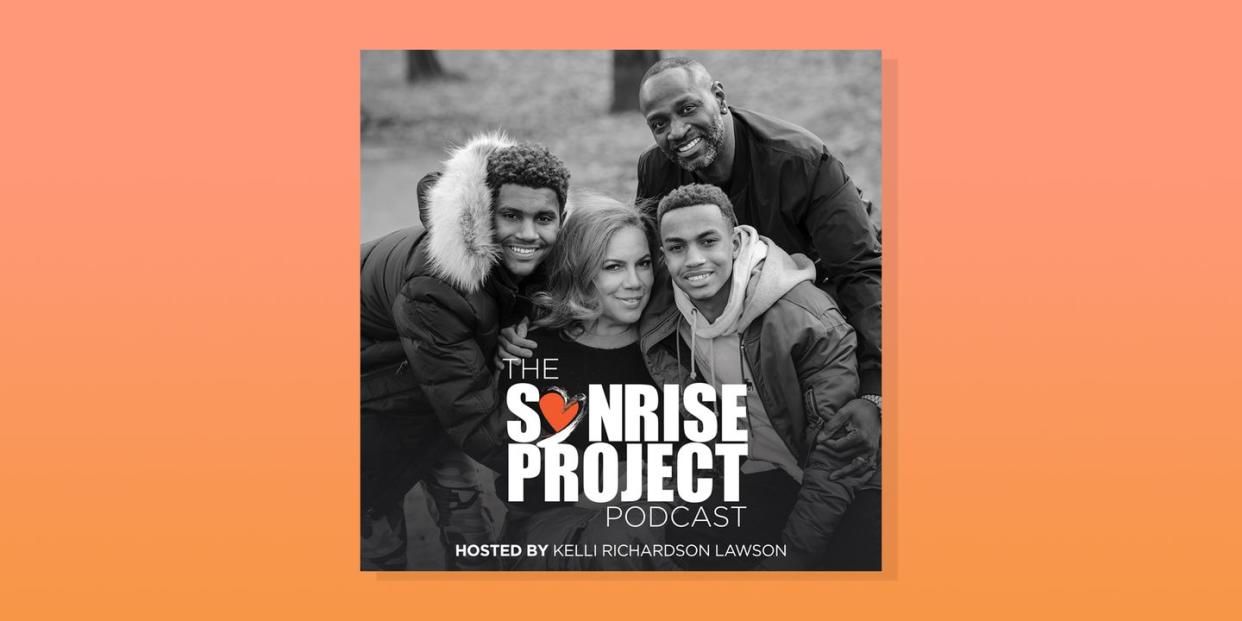The "SonRise Project Podcast" Speaks to Black Parents of Kids With Mental Illness

Eight years ago, Kelli Richardson Lawson stood in front of a crowd at the I Am Woman conference in Atlanta, poised to give a keynote address on the topic of abundance. Then, the computer crashed, along with her slides. She had to ad-lib.
What Lawson did next surprised her. For the first time, Lawson—CEO of the JOY Collective marketing agency—spoke openly about the event that had recently sent her family reeling. Lawson's eldest son, Kyle, had attempted to take his own life the year after graduating from high school.
"All of these things erupted out of me," Lawson says. Looking back, Lawson identifies that unintentional outpouring as the beginning of her mission to share her story, and in doing so, empower other parents facing similar situations. "In that moment of significant vulnerability, I felt as if a weight had been released. And I knew that I connected with so many people," she says.
In 2020, Lawson started The SonRise Project to create a a space for other Black parents whose children were struggling with mental health and addiction. Each Sunday morning, parents call into The SonRise Project's weekly call to hear an expert's lecture and then to speak to one another in a safe space. "A lot of our learning comes from hearing one another's stories," Lawson says.
With The SonRise Podcast Project, even more people can listen in. Launching on September 27, the weekly podcast—part of OWN's podcast network—will air edited versions of those calls. "My hope is that listeners know they're not alone. We're a village," Lawson says. Normally, between 50 to 80 people call into The SonRise Project's Sunday sessions; now, Lawson hopes, that number will grow to the thousands. "Millions, someday."
Subscribe to the SonRise Project Podcast
Lawson created The SonRise Project because she couldn't find a place to connect with other Black parents over the things her family was experiencing. While Kyle was staying in a therapeutic facility in Connecticut, Lawson and her husband visited him every other weekend, and participated in guided therapeutic sessions with a small group of other parents whose children were in treatment.
"One Saturday, we realized we were the only Black parents in the room," Lawson recalls. Lawson found the group discussion missed a crucial element of her family's experiences. "While our experiences were very similar with our children, there was a whole other dynamic of having a Black son in this world in 2020. There's an additional dimension of raising a Black man in a state of systemic racism."
When she went to find a support group for Black parents of kids with mental illness, she couldn't—so she had to make one herself. Lawson suspected there would be other people interested in such a group. "I believe everybody has something that they're going through, but we don't talk about it openly because we're ashamed or we have this guilt or pressure to be perfect. It's okay to have a little crack in the armor and then to talk about it with other people," she says.
With the SonRise Project's calls and podcast, Lawson also hopes to combat the stigma of mental illness that exists within the Black community. Per a 2019 study, Black adults are 20% more likely to report psychological distress than white adults, but only one in three will receive treatment. As Lawson pointed out, mental health issues are compounded by the psychological toll of living under systemic racism.
"It's okay to have a little crack in the armor and then to talk about it with other people."
"My goal is to silence the shame and eliminate that. It runs so deeply in Black communities, including my family," Lawson says. "This is intended to help people not have that stigma and feel OK opening up in a space that has nothing but love and compassion, and similar people with similar issues. It gives people space to be vulnerable."
When starting the SonRise Project, Lawson encountered skepticism from within her family. "This is no shade on my mom—I love her. But she said to me, When I was first starting this, I think you saying a lot." However, Kyle—who also shared his story on Instagram—Lawson permission to document their journey.
And it's been a journey. Over the past three years, through work and reflection, Lawson says she and her husband have grown as parents.
"We always thought we needed to fix our child. The reality is, we needed to fix ourselves. Teenagers are really looking for spaces where they can be free, where they can explore that's normal. We didn't do that. Being able to take a step back and say, Okay, well, what was our role in this? Our role is that we were super strict and full of fear," she says.
Now, Lawson says the phrase "I love you" is said often and easily in her household, and isn't attached to any accomplishments. "We love you for who you are—not for you as a swimmer or you as the whatever. We just love you period," she says. "Kids need to hear that and know that deeply and really feel it."
Recently, Lawson and her husband got Kyle set up with an apartment in Atlanta. When they said goodbye, Kyle cried on her shoulder. "He said, 'I love you. I'm just really going to miss you.' I hadn't heard that in years,'" Lawson says.
You Might Also Like

